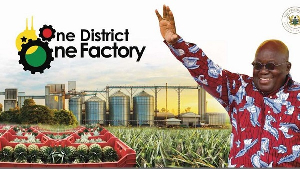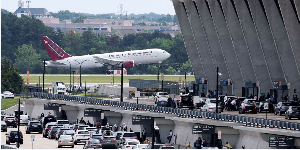Industrialisation is a key propeller of economic growth, as evidenced by the Industrial Revolution that transformed the United States and Europe into first-world nations within a generation. Unfortunately, Ghana's industrial trajectory has been markedly different. Today, Ghana is less industrialised than it was in 1970. This "de-industrialisation" over the past 7 years has hindered economic growth and living standards, highlighting an urgent need to reverse these trends.
Ghana boasts a comparative advantage in natural and agricultural resources, which should be leveraged to spur industrialisation and economic transformation. As per Ricardo's theory, our comparative advantage in resources like cocoa, palm, and rubber should guide the industries in which we develop competitive advantage. Historically, Nkrumah's state-driven industrialisation strategy established a range of industries linked to our natural resources. However, his blueprint was curtailed post-overthrow, with subsequent privatisation and liberalisation policies contributing to de-industrialisation.
One glaring example is our continued export of raw cocoa, which occupies a US$10 billion global market, while the chocolate market is worth ten times as much at US$100 billion. Our failure to process and add value to cocoa before export represents a significant lost opportunity.
The Industry and Manufacturing Sector 2017 -2023
The abysmal performance of Ghana's industry and manufacturing sectors over the past several years underscores the urgent need for a stable macroeconomic environment and a conducive business climate.
From 2017 to 2023, the industry sector showed a steady decline, starting with a growth rate of 5.2% in 2017, dropping to 3.8% in 2018, and 2.4% in 2019, before plummeting to -0.9% in 2020, and -0.2% in 2021. Despite a slight recovery to 0.2% in 2022, it fell again to -0.4% in 2023. The manufacturing sector fared no better, starting at 1.1% in 2017 and falling to 0.5% in 2018, 0.7% in 2019, and a mere 0.2% in 2020, with a slight improvement to 1.0% in 2021, followed by a drop to -0.3% in 2022 and a minimal rise to 0.1% in 2023. These dismal figures reflect the broader economic challenges and highlight the critical importance of maintaining low inflation and low interest rates to foster a conducive business environment.
Ensuring economic stability through prudent macroeconomic management is essential for attracting investment, driving industrial growth, and ultimately achieving the goals of initiatives like the One District One Factory (1D1F) program. Without such stability, the prospects for significant industrial and manufacturing sector improvements remain bleak.
Challenges of the 1D1F Policy
1. Misalignment with Natural Resources: The 1D1F policy failed to sufficiently integrate local natural resources into its industrial strategy. Successful industrialisation requires factories that leverage local agricultural and natural resources, creating a sustainable supply chain. However, many 1D1F projects lacked this critical linkage, undermining their long-term viability. This creates the situation where government of Ghana still has to dole out tax waivers running into millions of Dollars on material imports for significant number of companies under the 1D1F program.
2. Scattered Approach: Dotting factories across the country, as seen in the 1D1F model, contrasts with the industrial parks seen in more successful industrial nations like China, South Korea, Malaysia, and Thailand. These countries established large industrial parks comprising strategic conglomerates, benefiting from technology transfer and economies of scale. The absence of such an approach in Ghana has diluted potential benefits, leading to inefficiencies.
3. Ownership and Management Issues: Effective industrialisation often requires a strong state-led approach, particularly in the initial stages. The curtailment of Nkrumah's state-led strategy in favour of privatisation has been detrimental. The 1D1F policy did not adequately restore this state leadership, leading to fragmented and poorly managed industrial efforts.
4. Lack of Enabling Environment: Successful industrialisation also hinges on an enabling environment, including regulatory ease, infrastructure, stable markets, favourable trade policies, research and development support, and macroeconomic stability. The 1D1F policy did not sufficiently address these critical areas, hindering the growth and sustainability of new industries.
5. Policy Dissonance: Reduction on Benchmark Values and 1D1F Policy; The government's decision to reduce the benchmark valuation of imports, effective April 4, significantly undermines the objectives of the One District One Factory (1D1F) initiative. The benchmark valuation for general goods has been slashed by 50 percent, and vehicles by 30 percent, as announced by Vice President Dr. Mahamudu Bawumia, now the flagbearer of the NPP at the maiden Town Hall Meeting on the economy. This policy shift, spearheaded by Dr. Bawumia, contradicts the 1D1F’s goal of fostering local industrialisation by making imported goods cheaper and more attractive than locally manufactured products. Consequently, this discourages the development and sustainability of domestic industries, further entrenching Ghana’s import dependency and hindering the success of the 1D1F strategy. Dr. Bawumia’s decision reflects a misalignment with the broader industrialisation objectives, ultimately jeopardising the country’s economic transformation efforts.
6. Policy Inconsistency: The policy inconsistency surrounding the reduction of benchmark values on imports further highlights the lack of thorough planning and foresight in policy formulation and implementation by the Economic Management Team, led by Dr. Mahamudu Bawumia. Despite the initial reductions being touted as beneficial, the reversal of the 50 percent benchmark value on imports, effective January 4, 2022, exposes the flawed decision-making process. Announced by the Ghana Revenue Authority on January 2, 2022, this reversal acknowledges that the expected outcomes were not achieved. Such abrupt policy shifts create an unstable economic environment, undermining investor confidence and stalling industrial initiatives like the One District One Factory (1D1F) program. Dr. Bawumia's role in these inconsistent policies reflects a critical lapse in strategic economic planning, emphasising the need for more robust, well-considered approaches to support sustainable industrial growth in Ghana.
The Way Forward
To overcome these challenges and reduce import dependency, Ghana must revisit its industrial strategy:
• Stable Macroeconomic Environment: A stable macroeconomic environment is crucial for the success of industrial policies like the One District One Factory (1D1F) initiative. This includes maintaining low inflation and low interest rates, which are essential for creating a conducive business environment. Low inflation ensures that the costs of goods and services remain predictable, allowing businesses to plan and invest with confidence. Similarly, low interest rates reduce the cost of borrowing, enabling businesses to access the capital needed for expansion and innovation. A conducive business environment also requires clear and consistent regulatory policies, reliable infrastructure, and supportive trade policies. Together, these elements foster a stable and attractive climate for both local and foreign investors, driving industrial growth and economic transformation. Ensuring these conditions requires prudent economic management and strategic planning, areas where the government must focus to mitigate past inconsistencies and build a resilient industrial sector.
• Strategic Industrial Clusters: Rather than scattering factories, the creation of industrial parks or clusters should be considered. These clusters can foster technology transfer, innovation, and economies of scale, driving industrial growth more effectively.
• State Leadership: The state must play a leading role in the initial stages of industrialisation, guiding and supporting industries. This involves not only direct investment but also creating a conducive environment for private sector participation.
• Linkage to Natural Resources: Industrial policies should be closely linked to local natural and agricultural resources, ensuring a sustainable and competitive supply chain. For example, more emphasis should be placed on value addition to cocoa and other agricultural products.
• Enabling Environment: Finally, the government must focus on creating a supportive environment for industrial growth. This includes regulatory reforms, infrastructure development, market stabilisation, favourable trade policies, and robust support for research and development.
Ghana's journey towards industrialisation requires a well-thought-out strategy that leverages its natural advantages while learning from international best practices. The lessons from the 1D1F policy's shortcomings should guide future government industrial policies to ensure sustainable economic growth and reduced import dependency.
Opinions of Wednesday, 5 June 2024
Columnist: Korsi Dzokoto















